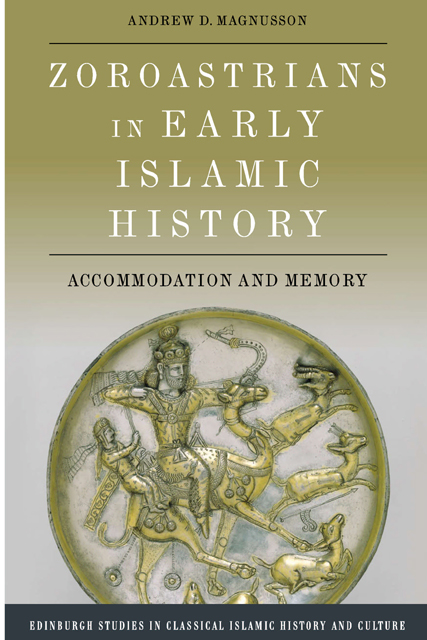Book contents
- Frontmatter
- Contents
- Acknowledgements
- A Note on Transliteration and Abbreviation
- Dedication
- Introduction: Zoroastrianism, Islam and Accommodation
- 1 Myth and Countermyth in Zoroastrian Historiography
- 2 Umar’s Dilemma: The Taxation of People Without a Book
- 3 Marriage, Meat and the Limits of Accommodation
- 4 Salman’s Charter as a Site of Memory
- 5 Fire Temple Desecration and Triumphal Tales of Violence
- 6 Rhetorical Zoroastrians in Early Islamic Discourse
- Conclusion: An Ambivalent Accommodation
- Appendix A Translation of an Iranian Recension of Salman’s Charter
- Appendix B Translation of an Indian Recension of Salman’s Charter
- Bibliography
- Index
5 - Fire Temple Desecration and Triumphal Tales of Violence
Published online by Cambridge University Press: 25 April 2023
- Frontmatter
- Contents
- Acknowledgements
- A Note on Transliteration and Abbreviation
- Dedication
- Introduction: Zoroastrianism, Islam and Accommodation
- 1 Myth and Countermyth in Zoroastrian Historiography
- 2 Umar’s Dilemma: The Taxation of People Without a Book
- 3 Marriage, Meat and the Limits of Accommodation
- 4 Salman’s Charter as a Site of Memory
- 5 Fire Temple Desecration and Triumphal Tales of Violence
- 6 Rhetorical Zoroastrians in Early Islamic Discourse
- Conclusion: An Ambivalent Accommodation
- Appendix A Translation of an Iranian Recension of Salman’s Charter
- Appendix B Translation of an Indian Recension of Salman’s Charter
- Bibliography
- Index
Summary
Local histories of Iranian cities, composed in the early Islamic era, often include one or more accounts of fire temple desecration. Why did Perso-Muslim authors preserve them? What do such tales reveal about the nature of Muslim–Zoroastrian relations after the conquest of Iran? How should modern historians interpret them? Much of the secondary literature presumes that they are indicative of hostility between Muslims and Zoroastrians. Yet if tales of fire temple desecration, intertwined as they often are with tales of mosque construction, seem ideally suited to undermine the idea of accommodation in post-conquest Iran, it is because they were designed to do so. Medieval Muslims wrote them to explain the victory of Islam over Zoroastrianism through the appropriation of sacred space. Tales of fire temple desecration, in other words, are not disinterested historical accounts; they are triumphal narratives of religious supersession.
To properly interpret such accounts, the careful historian of interreligious encounter must bear several caveats in mind when analysing them. First, early Muslims narrated tales of fire temple desecration for a variety of purposes. Even if the moral seems apparent, these stories should not be read presumptively or in isolation. They must be evaluated against the information available in other sources. Second, instances of fire temple desecration should not be isolated from the multiple contexts in which they occur. Muslims and Zoroastrians lived in direct contact for centuries in many communities. A sound understanding of the local dynamics at play in a given place and at a given time is necessary to properly interpret intercommunal violence. Third, these tales tend to exaggerate the numerical and political strength of fire early Islamic communities in Iran – or project the founding of these communities far into the past – in order to claim that Muslims were dominant (and Zoroastrians subservient) from the earliest days of their arrival. This is particularly true of stories purporting to describe the construction of the first mosque in a town. Since these tales can be rhetorical, it is important to read them critically.
Interpreting Fire Temple Desecration
Early Muslims chose to remember tales of fire temple desecration for a variety of reasons. Since these stories are usually embedded in Islamic texts dedicated to other topics, it is imprudent to take them at face value or ignore the work they are doing in a particular text.
- Type
- Chapter
- Information
- Zoroastrians in Early Islamic HistoryAccommodation and Memory, pp. 112 - 135Publisher: Edinburgh University PressPrint publication year: 2022



